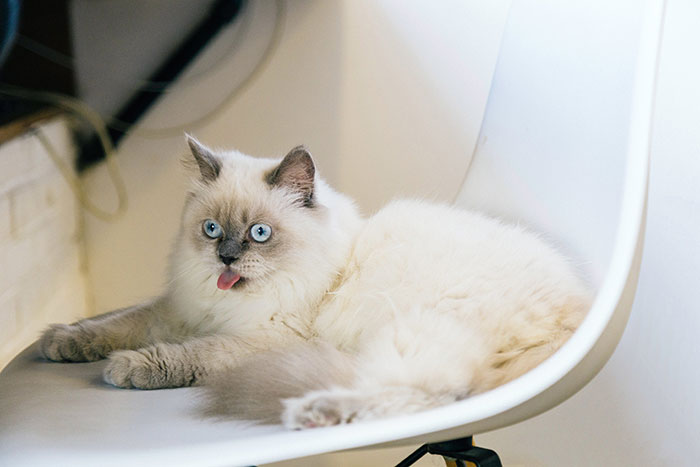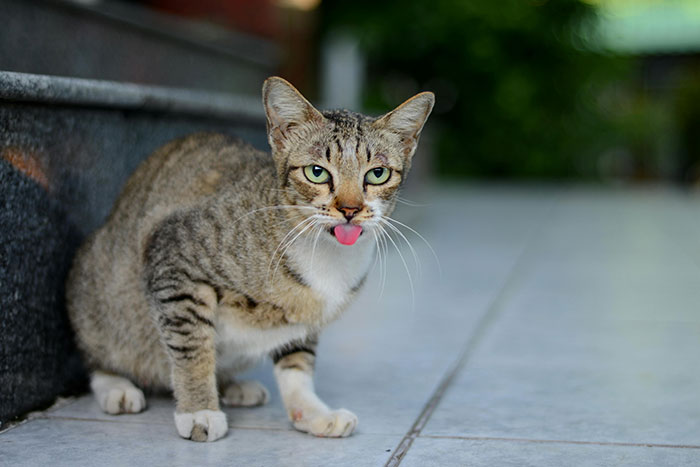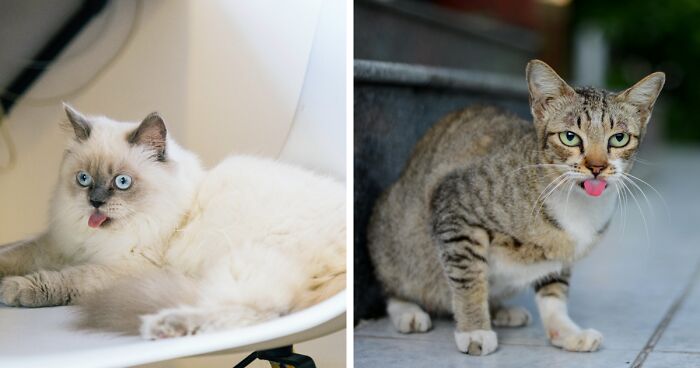Whether your cat is always lolling about with their tongue out or only does it occasionally, you’re likely wondering what exactly they’re up to and why.
For many, it will be expected. For others, it is a symptom of an underlying medical issue or oral disease.
Your cat may be sticking her tongue out at all times, or very irregularly. A cat parent should keep a close eye on this sort of behavior, monitoring closely for any other signs.
- Cats may leave their tongue out when exploring or grooming.
- Tongue ulcers, dental issues can cause a cat to stick out tongue.
- Respiratory distress in cats may lead to a protruding tongue.
- A cat's blep is normal behavior linked to the Flehman response.
- Drooling with a tongue out can indicate an oral health problem.
The information provided herein is for informational purposes only. Please refer to our disclaimer for more details..
Top 10 reasons for cat tongues to be out:
1.) Exploration of their environment. For some cats, when they are busy sniffing and investigating their surroundings, they may leave their tongue out for a few seconds, before remembering to pop it back in.
2.) Grooming behavior. As a cat licks and preens itself, you will notice its tongue may stay out during the grooming session. Once finished, they will retract the tongue and leave it in their mouth.

Image credit: Tranmautritam
3.)Tongue ulcers. Ulcers cause tongue discomfort, and keeping the tongue in the mouth can be uncomfortable. There are various causes of tongue ulcers, including localized burns, kidney disease, or cancer.
4.) Dental disease/periodontitis. Like a cat with tongue ulcers, one with gingivitis or rotten teeth may also stick their tongue out to relieve any pressure. Other signs of dental disease can include bad breath, trouble eating cat food, and seeing your cat drooling.
5.) An oral mass. Oral cancers are not uncommon in cats, with carcinomas being the most common kind. When large enough, your cat may be unable to keep their mouth shut, meaning their tongue lols out.
6.)Nausea. When feeling sick, your cat’s mouth may water excessively, and you might find their mouth open slightly. Alongside nausea, your kitty may have vomiting and a reduced appetite.

Image credit: Piya Nimityongskul
7.)Respiratory distress. Respiratory or cardiac disease can mean a cat struggles to get enough oxygen, so it starts to pant, which leads to a cat’s tongue sticking out. This is a red flag and requires an immediate trip to the veterinarian
8.) Missing teeth. If your cat has had many teeth removed, especially from the front of their mouth, their little tongue may no longer naturally sit inside their mouth. This tends to be more of an issue in flat-faced breeds.
9.) A broken jaw. After a trauma such as a car accident or falling from a height, your cat may suffer a fractured jaw. This can cause the mouth to open slightly, and the tongue to pop out. Your cat will be uncomfortable and struggle to groom and eat.
10.)A neurological disorder. A tongue that sticks out could be due to a neurological disorder, affecting the nerves and muscles of the face. There could be additional signs such as muscle tremors, pupil constriction, or trouble staying balanced.
Do all cats stick out their tongue?
Sticking out a tongue is normal animal behavior and is something that will happen from time to time.
One good example of this is the Flehman response, a normal reaction to detecting an interesting smell, such as a local cat in heat. The cat ‘sucks’ in the scent through the roof of their mouth, directing it to their vomeronasal organ, which influences their social and mating activity.
Why does my kitty do the blep?
Blepping is when your cat makes a funny face, opening their mouth and popping their tongue out. This is an example of them directing smells towards their vomeronasal organ (flehmen response). They are analyzing a nearby scent, and bleps are completely normal.
Why is my cat doing weird things with his tongue?
Your pet mat pokes its tongue out, leave it lolling, or use it to lick around its face. Some will only do this infrequently, and it is of no concern. For others, it may indicate there is more going on. If your cat is doing unusual things with their mouth and tongue that are new to you, it is best to schedule an appointment at the vet.
With what disease does a cat stick its tongue out?
If your cat is sticking out its tongue when it has never been used to do this, you will want to check with your vet. This is cause for concern and could be a sign of e.g., advanced dental disease, respiratory disease, or a cancer within the mouth.
A cat with an underlying disease generally shows signs such as rapid breathing, food refusal, or weight loss.
What if my cat is also drooling?
Excessive drooling alongside a tongue that pops out will usually point toward an oral issue. This could be, e.g. a foreign body in the mouth (your cat could have some string or wool caught under their tongue), a fractured tooth, gingivitis, a resorptive lesion, oral ulcers, or an oral mass.
Drooling will generally either be driven by nausea or difficulty with swallowing or closing the mouth. It can also be a sign of inflammation in the mouth.
FAQ
Does a cat stick their tongue out when nauseous?
Yes, they may stick their tongue out, and most cats also drool, refuse food, and hide away. You might find them gagging or retching, and many will vomit too. Most cases of nausea are short-lived and will resolve within 24 hours. These kitties can usually be managed with a bland diet and rest.
What are the papillae on a feline tongue?
Cats have tiny filiform papillae on their tongue that are ‘spines’, which give the tongue a harsh texture, almost like sandpaper. This makes the tongue abrasive and allows it to ‘latch’ on to whatever a cat is licking. They are important for grooming and keeping a cat’s fur nice and clean.
Is it normal for cats to never stick their tongue out?
Cats stick their tongue out for many different reasons, and they need to be able to do it to complete tasks, including grooming and eating. However, most kitties keep their tongue firmly inside their mouth when walking about or relaxing. If your cat cannot physically protrude their tongue, it is best to seek veterinary attention.
703views
Share on Facebook
 Dark Mode
Dark Mode 

 No fees, cancel anytime
No fees, cancel anytime 


















































0
0